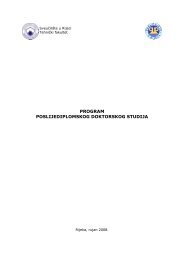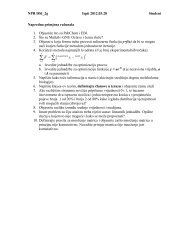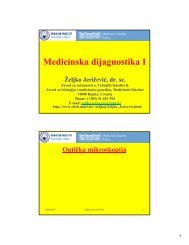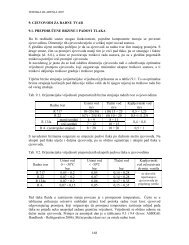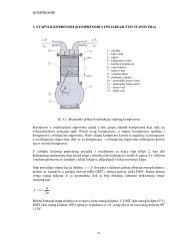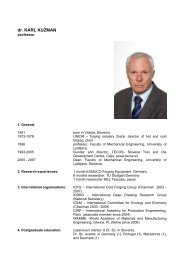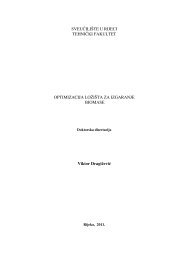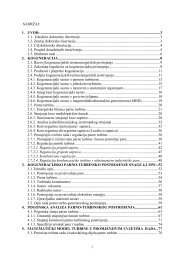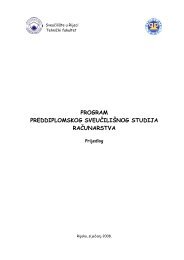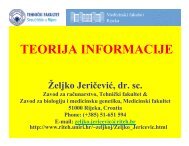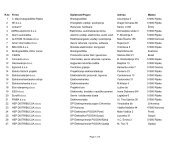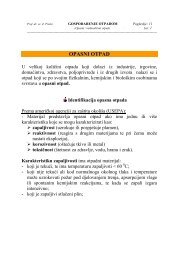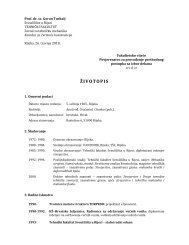universityâenterprise cooperation
universityâenterprise cooperation
universityâenterprise cooperation
Create successful ePaper yourself
Turn your PDF publications into a flip-book with our unique Google optimized e-Paper software.
and legislative reforms in recent years, they<br />
are generally characterized by an unfavorable<br />
RTD infrastructure (outdated or inadequate),<br />
limited links between universities and research<br />
institutes and enterprises, insufficient regional<br />
and international <strong>cooperation</strong>, massive<br />
brain drain, lack of national funding due to<br />
low level of GDP and transitory economies,<br />
as well as weak innovative capacity of the<br />
industry sector.<br />
For WB region it means a lot of effort<br />
to overcome the current gap and reach<br />
requested EU RTD level for successful<br />
integration into ERA. Adopting the “EU -<br />
Western Balkan Action Plan in Science and<br />
Technology” (WBAP) [31] on Thessaloniki<br />
Summit in 2003 was an important step,<br />
which resulted in new initiatives, measures<br />
and incentives for RTD systems in the WBC.<br />
In order to facilitate S&T policy-related<br />
dialogue between the WBC, the EU Members<br />
States, and additional countries associated<br />
with the EU Framework Programme for<br />
RTD and the European Commission, a<br />
Steering Platform on Research for the<br />
Western Balkan countries was launched<br />
by Commissioner Potocnik in 2006. This<br />
dialogue platform is expected to play the<br />
central role in stimulating, monitoring, and<br />
supporting policy development in the WBC<br />
and S&T <strong>cooperation</strong> throughout Europe. The<br />
Information Office of the Steering Platform 1<br />
acts as an information point, which provides<br />
updates from different programmes and projects,<br />
disseminates event announcements, calls for<br />
papers and proposals and other relevant news<br />
items, reports on innovation infrastructures,<br />
needs-offer-matrix which discusses the<br />
most pressing needs of the countries and<br />
the different funding sources on offer.<br />
Since 2008, that Platform has supported<br />
by INCO-NET consortium (project with 26<br />
partners lasting till December 2011), which<br />
provide analytical and practical support for<br />
knowledge-based dialogue with a view to<br />
implementing a number of joint activities<br />
to foster <strong>cooperation</strong> throughout Europe,<br />
activities of the Information Office are<br />
continued on an even larger scale.<br />
Publication “Science and Technology in<br />
the Western Balkans”, edited by Elke<br />
Dall in April 2008 [73] consists of seven<br />
reports reviewing the condition of Science<br />
& Technology (S&T) in the Western Balkans.<br />
The objectives of these studies were to<br />
enhance understanding of the innovation<br />
systems in the WBC countries, and to give<br />
an overview of input and output indicators<br />
in the S&T systems, to identify significant<br />
1 www.see-science.eu<br />
37<br />
“During the last three days, the case has been made to increase efforts on all three fronts: education,<br />
research and innovation. I can safely say that we agree that efforts are required at all levels:<br />
local, regional, national and international. And I think very few would disagree that both the<br />
private and the public sectors must play their part.<br />
…<br />
There are at least three things we can do to strengthen research capacity in the Western Balkan<br />
Countries:<br />
- Firstly, we must achieve greater research <strong>cooperation</strong> at regional level and within European-level<br />
programmes;<br />
- Secondly, countries within the region should design integrated research policies; and<br />
- Thirdly, modernization and improvement of research capacity must be made a matter of priority.<br />
…<br />
In conclusion, let me state it in one more way: through cooperative reform and progress in education,<br />
research and innovation, this region is developing its identity as a vital part of the wider<br />
European family.”<br />
Janez Potocnik, European Commissioner for Science and Research<br />
Progress and the Knowledge Triangle in South Eastern Europe<br />
UNESCO Policy Forum on South Eastern Europe Higher Education, Science and Innovation<br />
Budva (Montenegro), 3 July 2008<br />
Current state in the WBC region 4



